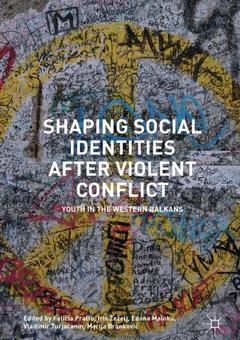Shaping Social Identities After Violent Conflict, Softcover reprint of the original 1st ed. 2017 Youth in the Western Balkans
Coordonnateurs : Pratto Felicia, Žeželj Iris, Maloku Edona, Turjačanin Vladimir, Branković Marija

Felicia Pratto is Professor of Psychology at the University of Connecticut, USA. Her research concerns social cognitive processes that contribute to group biases, intergroup relations, particularly power and the structuring of sexism and ethnocentrism, and international violence. She is co-creator of ‘Social Dominance Theory’.
Iris Žeželj is Assistant Professor of social Psychology at Belgrade University, Serbia. Her main areas of interest are social cognition, biases in memory, self-knowledge and group perception and inter-group relations. She has lead several international research projects on these topics.
Edona Maloku is Lecturer of Psychology at RIT Kosovo. Her research interests cover the national identity-building process in Kosovo’s new state and its effects on inter-ethnic relations after the conflict.
Vladimir Turjačanin is Associate Professor of Social Psychology at the University of Banja Luka, Bosnia and Herzegovina. His professional interests are in the area of ethnicity, ethnic relations, social identity, gender stereotypes and religious prejudice.
Marija Branković works in Faculty of Media and Communications at Singidunum University, Serbia. Her research focuses on psychological defences from the existential anxieties and their impact on social behaviour, self and social identifications, intergroup relations, persuasion and argumentation.
Focuses on several ethnic groups in four different countries in the Western Balkans
Draws conclusions about the differences and similarities in identity processes across these regions
Informs current debates about the psychological effects of majority/minority status
Date de parution : 01-2018
Ouvrage de 196 p.
14.8x21 cm
Disponible chez l'éditeur (délai d'approvisionnement : 15 jours).
Prix indicatif 116,04 €
Ajouter au panierDate de parution : 06-2019
Ouvrage de 196 p.
14.8x21 cm
Disponible chez l'éditeur (délai d'approvisionnement : 15 jours).
Prix indicatif 116,04 €
Ajouter au panier


